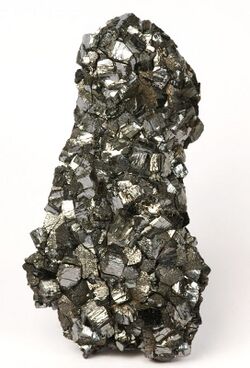Chemistry:Ramsdellite
| Ramsdellite | |
|---|---|
 Sample from Mistake Mine, Box Canyon District, Yavapai County, Arizona, USA | |
| General | |
| Category | Oxide minerals |
| Formula (repeating unit) | MnO2 (Mn4+O2) |
| Strunz classification | 04.DB.15a |
| Dana classification | 04.04.07.01 |
| Crystal system | Orthorhombic |
| Crystal class | Dipyramidal |
| Space group | Pbnm (no. 62) |
| Identification | |
| Formula mass | 86.94 gm (Mn 63.19% O 36.81%) |
| Color | Iron black, Black, Steel gray |
| Crystal habit | Granular / Massive-Fibrous / Platy |
| Cleavage | Good |
| Fracture | Conchoidal to uneven[1] |
| Tenacity | Brittle |
| Mohs scale hardness | 3 – Calcite |
| |re|er}} | Metallic |
| Streak | Brownish black |
| Diaphaneity | Opaque |
| Specific gravity | 4.79 g/cm3 (calculated) |
| Density | 4.37 g/cm3 (measured) |
| Optical properties | NCalc= 2.89 (Dcalc) / 2.72 (Dmeas) |
| References | [2] |
Ramsdellite (Mn4+O2) is an orthorhombic manganese dioxide mineral. It is relatively uncommon, and is usually found in deposits containing other manganese oxide crystals.
Name
Ramsdellite is named after the American mineralogist, Lewis Stephen Ramsdell (1895–1975).[2] Ramsdell spent almost all his career at the University of Michigan as a professional mineralogist. Ramsdellite was one of the new phases he first recognized in the "black manganese oxide" minerals. It was later named in his honour by Michael Fleischer and W. E. Richmond, who fully described the mineral in 1943.[4] The mineral is also called Groutellite.[5]
Chemistry and crystallography
The chemical formula for Ramsdellite is MnO2. The empirical formula is Mn4+O2.[2] Ramsdellite has the same chemistry as the more common pyrolusite, but is orthorhombic where pyrolusite is tetragonal.[1] Ramsdellite belongs to the Orthorhombic crystal system and Dipyramidal crystal class.[5] Properties:[6]
| Crystal | System | Orthorhombic |
| Point group | 2/m 2/m 2/m | |
| Form | Often pseudomorphs of groutite crystals | |
| Crystal habit | Platy, fibrous or massive | |
| Physical | Cleavage | Prominent, on three pinacoids and a prism |
| Tenacity | Brittle | |
| Hardness (Mohs scale) | About 3 | |
| D | Measured = 4.65–4.83 Calculated = 4.84 | |
| Optical | Opaque | |
| Color | Steel-gray to iron-black; yellowish white in reflected light. | |
| Streak | Black, may have brownish tint | |
| Luster | Brilliant metallic. | |
| Optical Class | Biaxial | |
| Anisotropism | Strong; pale yellow | |
| Bireflectance | Distinct. | |
| Cell | Space group | Pbnm. a = 4.533(5) b = 9.27(1) c = 2.866(5) Z = 4 |
Classification
The Dana classification is 4.4.7.1 (simple oxides: AX2). The Hey's CIM Ref is 7.18.8 (Oxides and Hydroxides, Oxides of Mn).[5] The Nickel–Strunz classification is 04.DB.15a, since the metal:oxygen ratio is around 1:2 and the mineral has medium-sized cations; chains of edge-sharing octahedra.[2] Other elements in the Ramsdellite / 04.DB.15 group are Paramontroseite: V4+O2 (15a), Akhtenskite: ε-Mn4+O2 (15b) and Nsutite: (Mn4+,Mn2+)(O,OH)2 (15c).[7][5]
Distribution
Ramsdellite is formed by oxidization of weathered manganese minerals such as manganite, and is often found in deposits containing various other manganese oxides. The mineral is relatively rare. [1] The type locality, the place where Ramsdellite was first identified, is the Lake Valley district in Sierra County, New Mexico, US.[5] Other locations in the USA where well-characterized samples of Ramsdellite have been found are Artillery Mountains, Arizona; Mistake mine, Yavapai County, Arizona; Idarado mine, near Telluride, Colorado; and Monroe-Tener mine, near Chisholm, Minnesota.[6]
Good samples have been found in Canada along the East River in Pictou County, Nova Scotia; in Mexico in Los Gavilanes, Baja California; In India in Dongari Buzurg, Bhandara, Maharashtra; in Australia in the Iron Monarch quarry, Iron Knob, South Australia; in Japan in the Otoshibetsu and Tanno mines, Hokkaido; in the Czech Republic at Horní Blatná; in Germany at Bütten-Adenstadt, Lower Saxony and Clara Mine, near Oberwolfach, Black Forest; in Egypt at Gebel To Yu, Yoider, and Um Bogna; and in South Africa at Hotazel, near Kuruman, Northern Cape.[6] Ramsdellite is found in the manganese deposits near Moanda, Haut-Ogooué Province, Gabon, mined by the Compagnie minière de l'Ogooué. These deposits were formed by supergene enrichment of Precambrian sediments.[8]
Notes
- ↑ 1.0 1.1 1.2 The Mineral Ramsdellite – galleries.
- ↑ 2.0 2.1 2.2 2.3 Ramsdellite Mineral Data.
- ↑ Warr, L.N. (2021). "IMA–CNMNC approved mineral symbols". Mineralogical Magazine 85 (3): 291–320. doi:10.1180/mgm.2021.43. https://www.cambridge.org/core/journals/mineralogical-magazine/article/imacnmnc-approved-mineral-symbols/62311F45ED37831D78603C6E6B25EE0A.
- ↑ Willett F. Ramsdell – U of Michigan.
- ↑ 5.0 5.1 5.2 5.3 5.4 Ramsdellite – mindat.org.
- ↑ 6.0 6.1 6.2 Ramsdellite – Mineral Data Publishing.
- ↑ Nickel-Strunz Oxides Classification – webmineral.
- ↑ National Materials Advisory Board 1981, p. 178.
Sources
- National Materials Advisory Board (1981), Manganese Reserves and Resources of the World and Their Industrial Implications: Report, National Academies, NAP:11507, https://books.google.com/books?id=3CIrAAAAYAAJ&pg=PA177, retrieved 2017-10-24
- "Nickel-Strunz Oxides Classification", webmineral.com, http://webmineral.com/strunz/strunz.php?class=04&subclass=04.D&group=04.DB#.Wj0HHt-nHIU, retrieved 2017-12-22
- "Ramsdellite", mindat.org (Hudson Institute of Mineralogy), https://www.mindat.org/min-3359.html, retrieved 2017-12-22
- "Ramsdellite Mineral Data", webmineral.com, http://webmineral.com/data/Ramsdellite.shtml#.Wjk9eN-nHIV, retrieved 2017-12-19
- Ramsdellite, Mineral Data Publishing, http://www.handbookofmineralogy.org/pdfs/ramsdellite.pdf, retrieved 2017-12-22
- "The Mineral Ramsdellite", galleries.com, http://www.galleries.com/Ramsdellite, retrieved 2017-12-19
- Willett F. Ramsdell, The University of Michigan, https://www.lib.umich.edu/faculty-history/faculty/willett-f-ramsdell/memorial, retrieved 2017-12-22
 |
